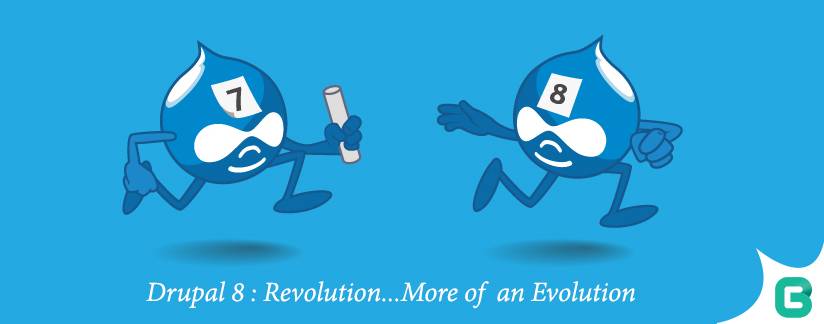
A great news for drupal enthusiast! After 4+ years of waiting, Drupal 8 has been finally unveiled. The first supported version of Drupal 8 got released on Nov 19 and is set ready for new development and use on production sites. Let’s go through some of the major changes of the most awaited Drupal version release.
Drupal is finally entering into the list of frameworks acquiring the PHP 5 native object oriented programming feature replacing the old procedural programming. One of the major addition to Drupal 8 is Symfony components, with a significant enlace for Drupal developers. It offers more learning opportunities for current Drupal 7 developers who do not have much exposure to modern PHP practices.
Drupal uses few of Symfony’s components thus extending them to provide support for the modules. The key component I would like to specifically mention is HttpKernel, It’s a Symfony component which is responsible for enhancing the process of converting a Request into a Response with the help of EventDispatcher. Using Symfony EventDispatcher, the application components can communicate with one another, allowing the system as a whole to run much more efficiently. Routing is the next major update coming in this Drupal 8 version. In previous versions of Drupal, there was only hook_menu which can actively manage a few different features. Apart from handling incoming requests, it provided menu links, action links, access control and a number of other features that are all tightly coupled together. With the use of Symfony2 Routing component, we are able to split up the route handling, and get a more better and feature-rich solution. Inside a YAML configuration file, the module routes are defined , and the individual routes set within it will point to actions that are defined in module’s classes.
So far we have gone through some of the major architectural changes, now let’s move on to the features that is going to make Drupal 8 something special.
Managing the site content from phone : Mostly, website admins prefer a desktop or laptop for managing the backend. It is because, mobile platforms does not support much of the backend functionality but Drupal 8 is built from the ground up with a focus on multi-device support. It’s core themes exploits responsive design on both front and back ends. Along with the visitors of the site, the administrators will also be able to experience an optimized view for every device and by which they can manage the site easily from mobile devices.
Easiness in deployment : Now we can add new features to the live site with ease. Early versions of Drupal stores all configuration settings in the Drupal database, in conjunction with all site content such as menus,pages,blocks, users and metadata. This method considerably complicates the process of deploying an updated site to a live site but now, Drupal 8 stores these settings in files placed in the library directory. This greatly simplifies deploying configuration changes from development to production.
Performance improvement: As part of the progression to the Symfony framework, Drupal 8 offers another option to the unique Hook system for attaching modules to Drupal core. That is, unlike the default with prior versions of Drupal, the current system does not require to load all enabled modules with each page request.
Advanced multilingual support : Drupal 7 supports multi-lingual functionality, but not at the level that Drupal 8 will. Drupal 7 requires extra modules, sometimes even up to 30. In Drupal 8, it is reduced to four modules that are part of the core. We can even translate our site’s content to any one of the 110 different supported languages with a few clicks. Translation updates will also be sent automatically to the site to ensure your site has the latest dictionary.
To sum up the highlights, Drupal 8 will furnish a more desirable experience for developers resulting the end users and clients enlarging the Drupal Community. We look forward to more such innovative improvements that will make Drupal to stay as the best open source CMS option available in the market.
Have a project concept in mind? Let's collaborate and bring your vision to life!
Connect with us & let’s start the journey
Share this article

Get in touch
Kickstart your project
with a free discovery session
Describe your idea, we explore, advise, and provide a detailed plan.


























